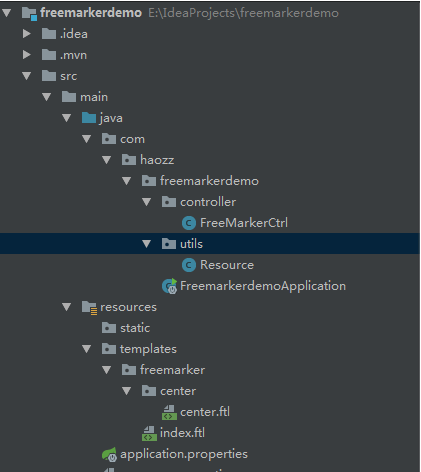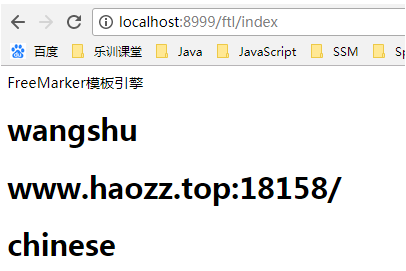жӮЁеҘҪпјҢзҷ»еҪ•еҗҺжүҚиғҪдёӢи®ўеҚ•е“ҰпјҒ
жӮЁеҘҪпјҢзҷ»еҪ•еҗҺжүҚиғҪдёӢи®ўеҚ•е“ҰпјҒ
иҝҷзҜҮж–Үз« з»ҷеӨ§е®¶д»Ӣз»ҚеҰӮдҪ•еңЁSpringBootдёӯж•ҙеҗҲfreemarkerпјҢеҶ…е®№йқһеёёиҜҰз»ҶпјҢж„ҹе…ҙи¶Јзҡ„е°Ҹдјҷдјҙ们еҸҜд»ҘеҸӮиҖғеҖҹйүҙпјҢеёҢжңӣеҜ№еӨ§е®¶иғҪжңүжүҖеё®еҠ©гҖӮ
йЎ№зӣ®ж–Ү件зӣ®еҪ•пјҡ

йҰ–е…ҲпјҢpom.xmlдёӯеҜје…Ҙfreemarkerзҡ„дҫқиө–пјҡ
<dependency> <groupId>org.springframework.boot</groupId> <artifactId>spring-boot-starter-freemarker</artifactId> </dependency>
еңЁapplication.properties(жҲ–yml)й…ҚзҪ®ж–Ү件дёӯеҠ е…Ҙfreemarkerзӣёе…ій…ҚзҪ®пјҡ
# freemarkerйқҷжҖҒиө„жәҗй…ҚзҪ® # и®ҫе®ҡftlж–Ү件и·Ҝеҫ„ spring.freemarker.tempalte-loader-path=classpath:/templates # е…ій—ӯзј“еӯҳпјҢеҸҠж—¶еҲ·ж–°пјҢдёҠзәҝз”ҹдә§зҺҜеўғйңҖиҰҒдҝ®ж”№дёәtrue spring.freemarker.cache=false spring.freemarker.charset=UTF-8 spring.freemarker.check-template-location=true spring.freemarker.content-type=text/html spring.freemarker.expose-request-attributes=true spring.freemarker.expose-session-attributes=true spring.freemarker.request-context-attribute=request spring.freemarker.suffix=.ftl
иҝҷйҮҢжҢҮе®ҡдәҶfreemarkerж–Ү件зҡ„и·Ҝеҫ„жҳҜclasspath/templatesпјҢеңЁresourcesж–Ү件еӨ№дёӢзҡ„templatesж–°е»әfreemarkerж–Ү件еӨ№пјҢ并且еңЁе…¶дёӯж–°е»әindex.ftlпјҲдёҠйқўй…ҚзҪ®ж–Ү件дёӯе·Із»ҸжҢҮе®ҡдәҶfreemarkerжЁЎжқҝзҡ„ж–Ү件еҗҺзјҖдёәftlпјүпјҡ
<!DOCTYPE html>
<html>
<head lang="en">
<meta charset="UTF-8"/>
<title></title>
</head>
<body>
FreeMarkerжЁЎжқҝеј•ж“Һ
<h2>${resource.name}</h2>
<h2>${resource.website}</h2>
<h2>${resource.language}</h2>
</body>
</html>жҲ‘们еңЁresourcesдёӢж–°е»әresource.propertiesпјҡ
com.haozz.opensource.name=wangshu com.haozz.opensource.website=www.haozz.top:18158/ com.haozz.opensource.language=chinese
еңЁSpringBootеҗҜеҠЁзұ»з»ҹи®Ўзӣ®еҪ•дёӢж–°е»әutilsеҢ…пјҢеңЁе…¶дёӯж–°е»әResourcesзұ»пјҲжӯӨеӨ„дҪҝз”Ёй…ҚзҪ®ж–Ү件引е…Ҙзӣёе…іж•°жҚ®пјүпјҡ
package com.haozz.freemarkerdemo.utils;
import org.springframework.boot.context.properties.ConfigurationProperties;
import org.springframework.context.annotation.Configuration;
import org.springframework.context.annotation.PropertySource;
//иЎЁзӨәиҝҷдёӘзұ»жҳҜдёҖдёӘиҜ»еҸ–й…ҚзҪ®ж–Ү件зҡ„зұ»
@Configuration
//жҢҮе®ҡй…ҚзҪ®зҡ„дёҖдәӣеұһжҖ§,е…¶дёӯзҡ„prefixиЎЁзӨәеүҚзјҖ
@ConfigurationProperties(prefix = "com.haozz.opensource")
//жҢҮе®ҡжүҖиҜ»еҸ–зҡ„й…ҚзҪ®ж–Ү件зҡ„и·Ҝеҫ„
@PropertySource(value = "classpath:resource.properties")
public class Resource {
private String name;
private String website;
private String language;
//...setter and getter
}ж–°е»әControllerеҢ…пјҢж–°е»әFreeMarkerCtrlзұ»пјҡ
package com.haozz.freemarkerdemo.controller;
import com.haozz.freemarkerdemo.utils.Resource;
import org.springframework.beans.factory.annotation.Autowired;
import org.springframework.stereotype.Controller;
import org.springframework.ui.ModelMap;
import org.springframework.web.bind.annotation.RequestMapping;
@Controller
@RequestMapping(value = "/ftl")
public class FreeMarkerCtrl {
@Autowired
private Resource resource;
@RequestMapping(value = "index")
public String index(ModelMap map){
map.addAttribute("resource",resource);
return "freemarker/index";
}
}иҝҷйҮҢзҡ„ModelMapе°ұзӣёеҪ“дәҺSpringMVCдёӯзҡ„ModelAndViewпјҢе…¶дёӯзҡ„еҫҲеӨҡж–№жі•д№ҹеҫҲзұ»дјјпјҢжҲ‘们иҝҷйҮҢиҝ”еӣһзҡ„еӯ—з¬ҰдёІе°ұжҳҜfreemarkerжЁЎжқҝзҡ„и·Ҝеҫ„пјҢдёҚз”ЁеҶҷеҗҺзјҖпјҢеӣ дёәй…ҚзҪ®ж–Ү件дёӯе·Із»ҸжҢҮе®ҡдәҶеҗҺзјҖдёә.ftl
жөҸи§ҲеҷЁеҸ‘иө·иҜ·жұӮпјҢеҫ—еҲ°з»“жһңпјҡ

иҝҷж ·пјҢSpringBootж•ҙеҗҲfreemarkerе°ұеҘҪдәҶгҖӮ
жҲ‘们еҶҚжқҘиҜ•дёҖдёӢиЎЁж јзҡ„еҪўејҸгҖӮ
FreeMarkerCtrlдёӯж–°еўһж–№жі•пјҡ
@RequestMapping(value ="center")
public String center(ModelMap map){
map.put("users",parseUsers());
map.put("title","з”ЁжҲ·еҲ—иЎЁ");
return "freemarker/center/center";
}
private List<Map> parseUsers(){
List<Map> list= new ArrayList<>();
for(int i=0;i<10;i++){
Map map= new HashMap();
map.put("name","kevin_"+i);
map.put("age",10+i);
map.put("phone","1860291105"+i);
list.add(map);
}
return list;
}еңЁresources/templates/freemarkerдёӢж–°е»әcenterж–Ү件еӨ№пјҢж–°е»әcenter.ftlпјҡ
<html lang="zh-CN">
<head>
<meta charset="UTF-8"/>
<title>${title}</title>
<style>
table {
width: 50%;
font-size: .938em;
border-collapse: collapse;/*иҫ№жЎҶеҗҲ并*/
}
th {
text-align: left;
padding: .5em .5em;
font-weight: bold;
background: #66677c;color: #fff;
}
td {
padding: .5em .5em;
border-bottom: solid 1px #ccc;
}
table,table tr th, table tr td { border:1px solid #0094ff; }/*и®ҫзҪ®иҫ№жЎҶ*/
</style>
</head>
<body>
<table>
<tr>
<th>Name</th>
<th>Age</th>
<th>Phone</th>
</tr>
<#list users as user>
<tr>
<td>${user.name}</td>
<td>${user.age}</td>
<td>${user.phone}</td>
</tr>
</#list>
</table>
</body>
</html>жөҸи§ҲеҷЁиҜ·жұӮпјҡ

еҸҜд»ҘзңӢеҲ°пјҢеңЁcenter.ftlдёӯпјҢжҲ‘们дҪҝз”ЁдәҶ<#list users as user>зҡ„еҶҷжі•пјҢиҝҷдёӘзӣёеҪ“дәҺjstlиЎЁиҫҫејҸдёӯзҡ„c:forEachгҖӮиҖҢusersйӣҶеҗҲжҲ‘们еңЁFreeMarkerCtrlе·Із»ҸеҲқе§ӢеҢ–дәҶгҖӮ
е…ідәҺеҰӮдҪ•еңЁSpringBootдёӯж•ҙеҗҲfreemarkerе°ұеҲҶдә«еҲ°иҝҷйҮҢдәҶпјҢеёҢжңӣд»ҘдёҠеҶ…е®№еҸҜд»ҘеҜ№еӨ§е®¶жңүдёҖе®ҡзҡ„её®еҠ©пјҢеҸҜд»ҘеӯҰеҲ°жӣҙеӨҡзҹҘиҜҶгҖӮеҰӮжһңи§үеҫ—ж–Үз« дёҚй”ҷпјҢеҸҜд»ҘжҠҠе®ғеҲҶдә«еҮәеҺ»и®©жӣҙеӨҡзҡ„дәәзңӢеҲ°гҖӮ
е…ҚиҙЈеЈ°жҳҺпјҡжң¬з«ҷеҸ‘еёғзҡ„еҶ…е®№пјҲеӣҫзүҮгҖҒи§Ҷйў‘е’Ңж–Үеӯ—пјүд»ҘеҺҹеҲӣгҖҒиҪ¬иҪҪе’ҢеҲҶдә«дёәдё»пјҢж–Үз« и§ӮзӮ№дёҚд»ЈиЎЁжң¬зҪ‘з«ҷз«ӢеңәпјҢеҰӮжһңж¶үеҸҠдҫөжқғиҜ·иҒ”зі»з«ҷй•ҝйӮ®з®ұпјҡis@yisu.comиҝӣиЎҢдёҫжҠҘпјҢ并жҸҗдҫӣзӣёе…іиҜҒжҚ®пјҢдёҖз»ҸжҹҘе®һпјҢе°Ҷз«ӢеҲ»еҲ йҷӨж¶үе«ҢдҫөжқғеҶ…е®№гҖӮ